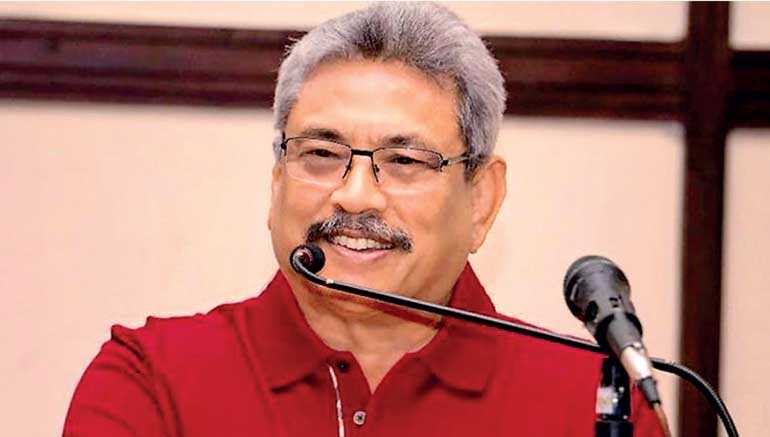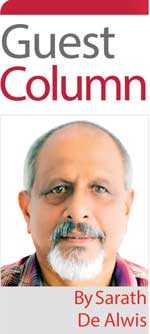Thursday Feb 19, 2026
Thursday Feb 19, 2026
Tuesday, 10 March 2020 00:00 - - {{hitsCtrl.values.hits}}

President Gotabaya Rajapaksa
When ‘we the people’ is replaced with ‘me the people’, there is no denying that democracy is in grave jeopardy. Autocratic governance is around the corner.
For the leader to deliver, all obstacles must be removed. The rationale of all populist leaders is that they and they alone speak for the people.
Sooner than later, populism must have its tryst with authoritarianism. It is inevitable. Then, it is only a short walk from “we the people” to “me the people”.
“Yes, we did a lot in the first 100 days. But as per my standards, I am not satisfied.” This was the portentous pontifical preamble with which President Gotabaya Rajapaksa started his recent interactive exchange with editors of media institutions, soon after dissolution of Parliament.
The deepest truths are read in between lines. The overarching perspective was on matching performance with promise. The argumentative emphasis was on explaining why it was essential for him to obtain a two-thirds majority at the next Parliamentary Election. 
The President’s wide-ranging discourse covered the essentials of efficient governance. His laser-sharp focus was on the 19th Amendment.
His views on the 19th Amendment and the independent commissions set up under its provisions were unhesitatingly censorious and at times hypercritical. The performance of one member of the Independent Elections Commission appeared to have distressed the serenity of the President.
The wide-ranging pre-elections backgrounder had one purpose. It was to explain why he needed a two-thirds majority in the next Parliamentary Elections.
The President felt shackled by the 19th Amendment. “People voted me with high expectations to deliver as the Executive President. If the President can’t deliver what the people want, what is the use of the Constitution,” Rajapaksa said.
He is right about the 19th Amendment imposing some restraints on the untrammelled powers of the Executive Presidency created under the 1978 Constitution, which replaced a titular president with an executive president. But we must differ on the purpose of a constitution. Organised society perceives constitutions as instruments serving a higher moral purpose, which encompasses social justice, equity, and the rule of law.
We cannot go back and change the beginning. Yet going back to the beginning may help us to comprehend our present predicament, and perhaps change the ending.
The office of the Executive Presidency of the 1978 Constitution was tailor-made for J.R. Jayewardene. The 1977 General Election under the first-past-the-post system gave the UNP a five-sixths majority.
Our first Executive President J.R. Jayewardene converted his 140-seat majority, obtained with 50.92 of the total polled at the 1977 Parliamentary Elections, into what he called an Executive Presidency. He claimed that all what he couldn’t do was to make a woman a man or vice versa. He didn’t tell the whole story. He made Parliament an impotent talk shop.
What JRJ did with his five-sixths majority was akin to what Napoleon did when he crowned himself and declared that the republic would now have authority from above and trust from below.
“I saw the crown of France, laying on the ground, so, I picked it up with my sword,” said Napoleon. The five-sixths parliamentary majority was the sword J.R. Jayawardena used. What he picked up was a crown. A trait that runs in the family: see how his nephew runs his party.
In 1982, when Parliamentary Elections were due, he had no sword to retain his crown. Proportional representation regulated the pendulum of public opinion. The irrational swing between sense and nonsense was no longer possible.
JRJ was forced into the aberration of a rigged referendum to retain his crown.
The 17th Amendment and the 19th Amendment are quasi-corrective measures to make a monarchical presidency into at least the semblance of an accountable presidency.
The 1978 Constitution is a democratic aberration. It is a travesty of democracy. One need not go far to look for proof; there is living breathing proof. The 1978 Constitution was abolished by elections. D.E.W. Gunasekara, the occupational communist, entered Parliament to replace the quintessential communist Sarath Muttetuwegama. Can you contemplate a more abominable aberration than that?
For better or worse, we are “stuck” with this Constitution as amended by the 19th Amendment. And we must preserve our democratic freedoms. The Constitution resonates in people’s mind not as an instrument to aggrandise a President, but as a means to preserve our liberties and to strive for a better way of life.
The citizen is the most distinctive component of a democracy. Not the President. All regimes have constitutions and rulers. Only the system where citizens rule is called democracy. In a modern political democracy, the rulers are held accountable for their actions in the public realm by citizens, acting indirectly through the competition and cooperation of their elected representatives.
That is why the next Parliamentary Election should not give a two-thirds majority to the President or his party.
A hybrid of a presidential and parliamentary system such as ours has two forms of accountability. Vertical accountability and horizontal accountability.
The Executive President is elected by the people in the expectation that the elected President will be responsive and accountable to the people.
It is the distilled essence of vertical accountability. In the case of a plural society such as ours, vertical accountability presupposes inclusivity.
Democracy demands accountability to the majority and protection to the defeated minority. That civic norm has vanished after the adoption of the 1978 Constitution.
The idea of impeachment embedded in the Constitution is a clear reminder of the concept of vertical accountability. The institutional polarisation that occurred under the 19th Amendment is a matter to be celebrated as a triumph of democracy. It is not a signal inviting the withdrawal into either an efficient autocracy or crony kleptocracy.
There is a human face to political polarisation. The popularly-elected leader can turn out to be a menace to democracy. Not because he is intrinsically wicked. But because he is human.
The 19th Amendment has its inadequacies. But it restored civic engagement of the citizen in a quasi-monarchic bazaar run on patronage.
The 19th Amendment has done enormous good. It has exposed the role of money in our politics. It has allowed us to discover who the political class listen to. It has exposed the economic interests of organised groups who shape State policy.
We must not be dazzled by the promise of governance by technocrats. Technocrats look for what works and not for what is good or just. What works and what is effective must not take precedence over what is legitimate and what is equal.
Democracy is ‘rule by the people’. The people must always have the freedom to reject what they disagree with. Rule by the people is not some impossible to define ‘will of the people’ defined, shaped and altered by ‘me’.